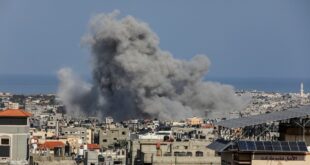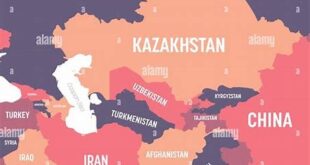Last week’s conference in Moscow which was held under the slogan of “Journalists from Muslim countries against extremism” has provided an opportunity amongst media anchors how to combat and encounter terrorism and extremism which exploit media for the benefit of their operational efficiency, information gathering, recruitment, fund raising, and propaganda schemes.
The forum took place from 8 to 9 December in Moscow with the attendance of more than 50 journalists from Russia, Algeria, Morocco, Tunisia, Iran, Kuwait, Egypt, Afghanistan, Turkey, UAE, Sudan, Pakistan, Lebanon and Syria.
The event, which was organized by “Russia-Islamic World”, Group of Strategic Vision, focused on real reasons of terrorism and extremism and that terrorism is not labeled to a certain religion. The conference discussed that terrorism is a category of political violence, which is intended to influence foreign and domestic governments, as well as communities. Terrorism uses its immediate victims and material targets for semiotic and symbolic purposes.
This symbiosis is not inevitable. Implementing certain policies that are different than the previous failed policies can facilitate the breaking of that cycle by forcing at least one side of the equation–the media–to act in a more responsible, more conscious, and more cooperative manner. Only then starving the terrorists of the oxygen of publicity on which they depend can become possible and more robust steps can be taken to win the ideological and actual battle against terrorism.
The conference revealed that the goals of terrorists are not solely limited to attracting the attention of the masses, but rather to publicize their political causes, inform about the motives for terrorist deeds, and explain their rationale for resorting to violence.
The media functions as a tool to shrink the power asymmetry between them and the entity they fight against in an actual and ideological warfare, create an atmosphere of fear and suspicion, legitimize their acts, and reach greater audiences
Dr. Veniamin Popov, ambassador, director of the civilizations’ Partnership Centre and Coordinator of Vision Group said that Russia is a central player on a number of key issues in the world including the Middle East.
“Moscow supports moderation and combats extremism which is risky to the stability of world,” said Dr. Popov.
“The fight against this phenomenon must be made, first of all, in the field of information, because the idea of killing and committing acts of intimidation and acts of terror are much more dangerous than the terrorist acts themselves. Young people commit murders by succumbing to the manipulation of certain individuals driven by political objectives,” Dr. Popov added.
He reiterated: “We must recognize that the terrorist activity sometimes leads results. In developed countries, young people face difficulties to keep up with and they seek the easiest way. This offer is exactly what the terrorist organizations seek to achieve.
Dr. Popov pointed out that in Muslim countries, such as North Africa, for example, 30-35% of young people suffer from unemployment. Those extremist groups and terrorists offer these youngsters an opportunity to earn extra money.
Media war against extremists
Terrorists’ means of communication greatly vary. Indeed, technological advancements and changing audience behavior in the past decade enabled terrorist groups to utilize media tools with greater convenience. The mass media of communication have changed in dramatic ways, mostly because of the global reach of the Internet. The new and emerging media has made it easier for terrorists to publicize their messages to the world via websites at their own discretion and “new technologies have simply allowed the dissemination of terrorist messages to reach a broader audience with a more concise message.
Needless to say, terrorism is an attractive boon for media coverage, mainly because terrorist attacks make viewer ratings surge and profits increase. To be more specific, terrorism has many aspects that make it a very attractive subject for the media, as it has the elements of drama, danger, blood, human tragedy, miracle stories, heroes, shocking footage, and action.
Another reason is that violence is a central and defining quality in contemporary television culture and is critical to the semiotic and financial momentum of contemporary media organizations.
The audience highlighted that the problem does not lie in why the media covers terrorism, but lies in how the media covers terrorism. It is by and large the case that the media covers terrorist acts by writing sensation-seeking, enlarging anecdotic stories, especially on who is to blame, repeating the same images over and over again, separating physical and mental health consequences of disasters, and creating new syndromes.
To understand how the media portrays terrorists and covers related stories and news, one should take a closer look at the mediums the media employs. The media generally uses agenda setting and framing to highlight and make certain issues more prominent than others. Agenda setting is the theory that the more attention a media outlet pays to a certain phenomenon, the more importance the public attributes to such an issue.
Framing, on the other hand, is “selecting some aspects of a perceived reality and making them more salient in a communicating text, in such a way as to promote a particular problem definition, causal interpretation, moral evaluation, and/or treatment recommendation for the item described”.
Counter cyber-terrorism
The Internet has become a central forum in a global scale for debate among numerous communities that are being directly affected by the global political violence. The communication of violent and oppressive groups has also heavily relied on the Internet. In other words, the age of the Internet has brought an age of online terrorism and enabled terrorists to use the web to recruit, raise money, and spread their messages. Even though the regulation of the media, specifically the Internet, presents a fundamental dilemma due to the inherent tension between censorship and the democratic tradition of free speech, privacy, and press freedom, it is crucial to take countering measures against the cyber activities of terrorists. These measures can include tracking their activities on online forums, following their conservations and activities on social media, and prevent the spread of radicalizing materials from specific websites. In addition to that, enacting laws at national level to punish the ones using the Internet to provoke the public, recruit and train, and propagandize can identify terrorists and prevent a potential attack.
Author: Dr. Shehab Al Makahleh
 Geostrategic Media Political Commentary, Analysis, Security, Defense
Geostrategic Media Political Commentary, Analysis, Security, Defense





